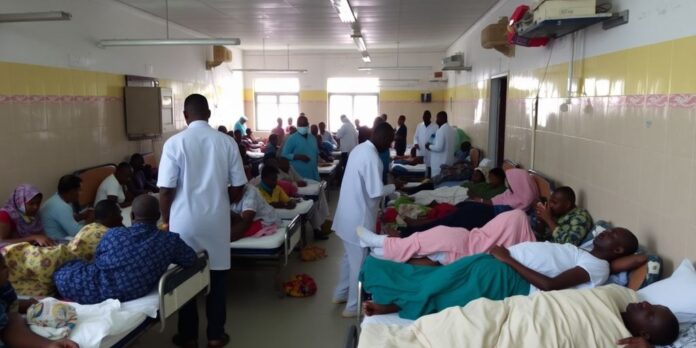The healthcare system in Abuja is facing a severe crisis, with hospitals overwhelmed by patient demand and a critical shortage of medical personnel. Recent reports highlight the dire conditions in public healthcare facilities, prompting calls for a state of emergency to address the escalating challenges.
Key Takeaways
- Abuja’s hospitals are experiencing a critical shortage of bed space and medical staff.
- Patients often face long wait times and inadequate care, leading to preventable deaths.
- The House of Representatives has called for emergency funding to improve healthcare services.
Overwhelmed Hospitals
Public hospitals in Abuja are struggling to cope with the increasing population and demand for healthcare services. Many facilities were built years ago without adequate plans for expansion, resulting in overcrowding and insufficient resources. Patients frequently report being turned away due to a lack of available beds, leading to tragic outcomes.
Patient Experiences
Residents have shared harrowing accounts of their experiences in Abuja’s healthcare system:
- Chidinma, a mother, was advised to seek private care for her child after a terrible experience at Maitama District Hospital, where she faced long wait times and inadequate facilities.
- Oye recounted how his wife was misdiagnosed at Asokoro District Hospital, leading to a near-fatal situation before receiving proper treatment elsewhere.
These stories reflect a broader trend of dissatisfaction and fear among patients relying on public healthcare.
Government Response
In response to the crisis, the House of Representatives has called for a state of emergency in the healthcare sector. This motion, presented by Rep. Nnamdi Ezechi, emphasizes the urgent need for:
- Emergency funding for hospital upgrades.
- Recruitment of medical personnel to alleviate staff shortages.
- Acquisition of critical medical equipment to improve service delivery.
The lawmakers highlighted that without immediate intervention, the healthcare crisis could escalate, threatening the well-being of Abuja’s residents.
Challenges Faced by Healthcare Workers
Healthcare professionals in Abuja are also feeling the strain. Many doctors are leaving the country for better opportunities, exacerbating the shortage of skilled personnel. The Nigerian Medical Association has pointed to poor working conditions, inadequate pay, and a lack of essential resources as key factors driving this exodus.
The Way Forward
Experts suggest several measures to address the healthcare crisis in Abuja:
- Expand existing facilities to accommodate the growing population.
- Invest in primary healthcare to reduce the burden on hospitals.
- Enhance the working conditions for healthcare workers to retain talent.
Dr. Zainab Nasiru Ladan, a medical professional, emphasized the need for better infrastructure and support for healthcare workers to ensure quality care for patients.
Conclusion
The healthcare system in Abuja is at a critical juncture, with urgent action needed to prevent further deterioration. The call for a state of emergency reflects the seriousness of the situation, and it is imperative that both government and private stakeholders collaborate to restore the integrity of healthcare services in the capital. Without immediate intervention, the lives of countless residents remain at risk.
Sources
- Patients left to die: Inside Abuja’s horror public healthcare system (2), Punch Newspapers.
- Reps call for state of emergency in FCT health sector, Daily Trust.
- Healthcare: Bed space, manpower shortage hit Abuja hospitals, Daily Trust.


